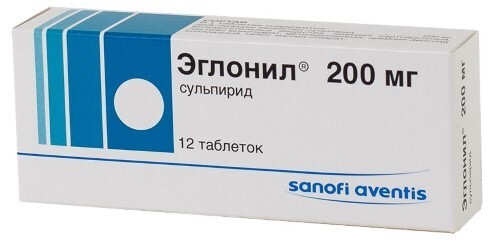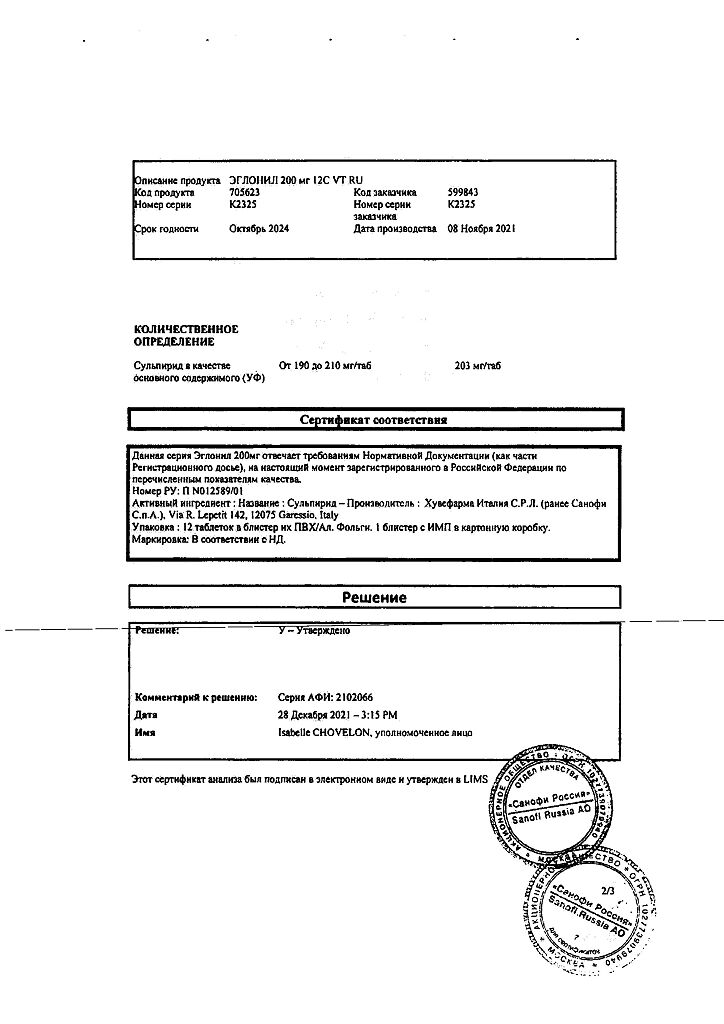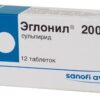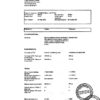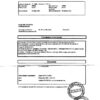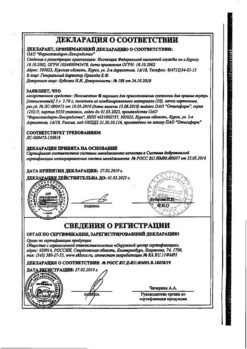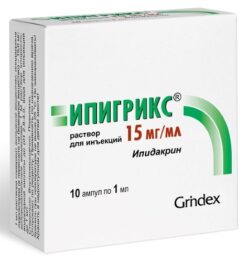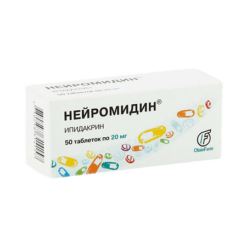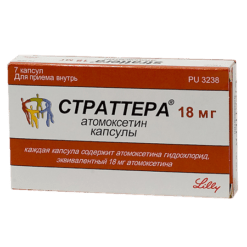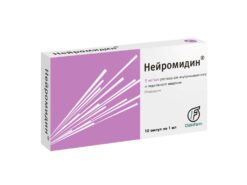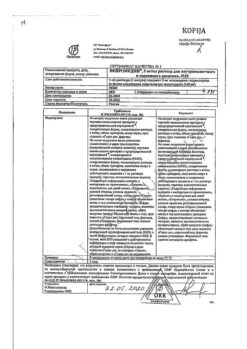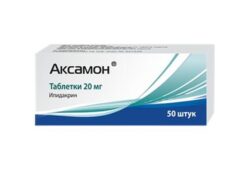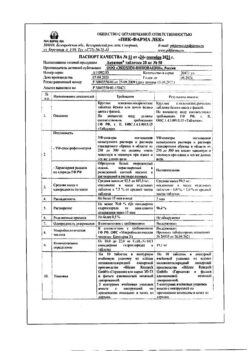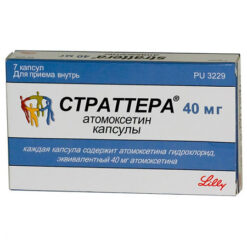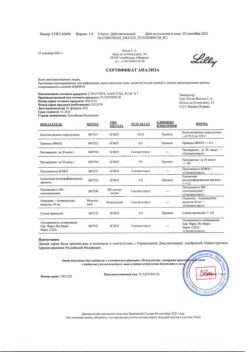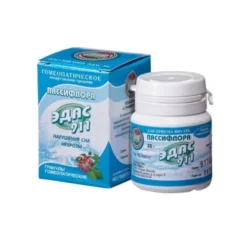No products in the cart.
Eglonil, tablets 200 mg 12 pcs
€6.32 €5.61
Out of stock
(E-mail when Stock is available)
Description
Eglonil has moderate neuroleptic activity combined with stimulant and thymoanaleptic (antidepressant) effects.
The neuroleptic effect is associated with antidopaminergic action. In the central nervous system sulpiride blocks predominantly dopaminergic receptors of the limbic system, and on the neostriatal system it has little effect, it has an antipsychotic effect. The peripheral action of sulpiride is based on inhibition of presynaptic receptors. An increase in the amount of dopamine in the CNS is associated with an improvement in mood, and a decrease in mood – with the development of symptoms of depression.
The antipsychotic effects of sulpiride are seen in doses greater than 600 mg/day; in doses up to 600 mg/day, stimulant and antidepressant effects predominate.
Eglonil has no significant effect on adrenergic, cholinergic, serotonin, histamine and GABA receptors.
In low doses Eglonil may be used as adjunctive treatment of psychosomatic diseases, in particular it is effective in relieving negative psychic symptoms of gastric and duodenal ulcer. In irritable colon syndrome sulpiride reduces the intensity of abdominal pain and leads to improvement of the clinical condition of the patient.
Low doses of sulpiride (50-300 mg/day) are effective in dizziness, regardless of etiology. Sulpiride stimulates prolactin secretion and has central antiemetic effect (inhibition of vomiting center) due to blockade of dopamine D2-receptors of vomiting center trigger zone.
Indications
Indications
As monotherapy or in combination with other psychotropic drugs:
depression of various etiologies
acute and chronic schizophrenia;
acute delirious states;
Pharmacological effect
Pharmacological effect
Eglonil has moderate neuroleptic activity in combination with stimulating and thymoanaleptic (antidepressive) effects.
The neuroleptic effect is associated with an antidopaminergic effect. In the central nervous system, sulpiride predominantly blocks dopaminergic receptors of the limbic system, and has a slight effect on the neostriatal system; it has an antipsychotic effect. The peripheral effect of sulpiride is based on inhibition of presynaptic receptors. An increase in the amount of dopamine in the central nervous system is associated with an improvement in mood, and a decrease is associated with the development of symptoms of depression.
The antipsychotic effect of sulpiride is manifested in doses of more than 600 mg/day; in doses of up to 600 mg/day, the stimulating and antidepressant effect predominates.
Eglonil does not have a significant effect on adrenergic, cholinergic, serotonin, histamine and GABA receptors.
In small doses, Eglonil can be used as an additional remedy in the treatment of psychosomatic diseases; in particular, it is effective in relieving the negative mental symptoms of gastric and duodenal ulcers. In irritable bowel syndrome, sulpiride reduces the intensity of abdominal pain and leads to an improvement in the patient’s clinical condition.
Low doses of sulpiride (50-300 mg/day) are effective for dizziness, regardless of etiology. Sulpiride stimulates the secretion of prolactin and has a central antiemetic effect (suppression of the vomiting center) due to the blockade of dopamine D2 receptors in the trigger zone of the vomiting center.
Special instructions
Special instructions
Neuroleptic malignant syndrome: if hyperthermia of undiagnosed origin develops, Eglonil should be discontinued, as this may be one of the signs of the malignant syndrome described with the use of neuroleptics (pallor, hyperthermia, autonomic dysfunction, impaired consciousness, muscle rigidity).
Signs of autonomic dysfunction, such as increased sweating and elevated blood pressure, may precede the onset of hyperthermia and therefore represent early warning signs.
Although this effect of antipsychotics may be idiosyncratic in origin, it appears that certain risk factors may predispose to it, such as dehydration or organic brain damage.
QT interval prolongation: Sulpiride prolongs the QT interval in a dose-dependent manner. This effect, which is known to increase the risk of developing serious ventricular arrhythmias such as torsades de pointes, is more pronounced in the presence of bradycardia, hypokalemia, or congenital or acquired QT prolongation (in combination with a drug known to prolong the QT interval).
If the clinical situation allows, it is recommended that before prescribing Eglonil, make sure that there are no factors that may contribute to the development of this type of arrhythmia:
– bradycardia with a number of beats less than 55 beats/min,
– hypokalemia,
– congenital prolongation of the QT interval,
– simultaneous treatment with a drug that can cause severe bradycardia (less than 55 beats/min), hypokalemia, slowing of intracardiac conduction or prolongation of the QT interval.
Except in cases of urgent intervention, patients who require treatment with antipsychotics are recommended to undergo an ECG during the assessment process.
Except in exceptional cases, this drug should not be used in patients suffering from Parkinson’s disease.
In patients with impaired renal function, reduced doses should be used and monitoring should be increased; in severe forms of renal failure, intermittent courses of treatment are recommended.
Control during treatment with Eglonil should be strengthened:
– in patients with epilepsy, since the seizure threshold may be lowered;
– in the treatment of elderly patients who are more sensitive to postural hypotension, sedation and extrapyramidal effects.
Consumption of alcohol or use of medications containing ethyl alcohol during treatment with the drug is strictly prohibited.
During treatment with Eglonil, driving vehicles and operating machinery that require increased attention, as well as drinking alcohol, is prohibited.
Active ingredient
Active ingredient
Sulpiride
Composition
Composition
1 tablet contains:
active substance:
sulpiride 200 mg;
excipients:
potato starch,
lactose monohydrate,
methylcellulose,
colloidal silicon dioxide,
talc,
magnesium stearate
Contraindications
Contraindications
hyperprolactinemia;
acute intoxication with ethanol, hypnotics, opioid analgesics;
hypersensitivity to sulpiride or other components of the drug.
prolactin-dependent tumors (for example, pituitary prolactinomas and breast cancer);
affective disorders, aggressive behavior, manic psychosis;
pheochromocytoma;
breastfeeding period;
children under 18 years of age (for tablets and solution for intramuscular administration);
children under 6 years of age (for capsules);
in combination with sultopride, dopaminergic receptor agonists (amantadine, apomorphine, bromocriptine, cabergoline, entacapone, lisuride, pergolide, piribedil, pramipexole, kinagolide, ropinirole);
Due to the presence of lactose in the drug, it is contraindicated in congenital galactosemia, glucose/galactose malabsorption syndrome or lactase deficiency.
With caution:
It is not recommended to prescribe Eglonil to pregnant women, except in cases where the doctor, having assessed the balance of benefits and risks for the pregnant woman and the fetus, decides that the use of the drug is necessary.
It is not recommended to prescribe sulpiride in combination with ethanol, levodopa, drugs that can cause ventricular arrhythmias such as “torsade de pointes” (antiarrhythmic drugs of class 1a (quinidine, hydroquinidine, disopyramide) and class III (amiodarone, sotalol, dofetilide, ibutilide)), some neuroleptics (thioridazein, chlorpromazine, levomepromazine, trifluoperazine, cyamemazine, amisulpride, tiapride, pimozide, haloperidol, droperidol) and other drugs, such as: bepridil, cisapride, difemanil, intravenous erythromycin, mizolastine, intravenous vincamine, halofantrine, pentamidine, sparfloxacin, moxifloxacin, etc.
Precautions must be observed when prescribing Eglonil to patients with renal and/or liver failure, a history of neuroleptic malignant syndrome, a history of epilepsy or seizures, severe heart disease, arterial hypertension, patients with parkinsonism, dysmenorrhea, and the elderly.
Side Effects
Side Effects
From the endocrine system: the development of reversible hyperprolactinemia is possible, the most common manifestations of which are galactorrhea, amenorrhea, menstrual irregularities, and less often – gynecomastia, impotence and frigidity. During treatment with sulpiride, increased sweating and weight gain may occur.
From the digestive system: increased activity of liver enzymes.
From the side of the central nervous system: sedation, drowsiness, dizziness, tremor, early dyskinesia (spasmodic torticollis, oculogyric crises, trismus), which resolves with the administration of an anticholinergic antiparkinsonian drug, rarely – extrapyramidal syndrome and associated disorders (akinesia, sometimes combined with muscle hypertonicity and partially eliminated by the administration of anticholinergic antiparkinsonian drugs, hyperkinesia-hypertonicity, motor agitation, akatasia). Cases of tardive dyskinesia, characterized by involuntary rhythmic movements, mainly of the tongue and/or face, have been reported during long courses of treatment, which can be observed during courses of treatment with all antipsychotics: the use of antiparkinsonian drugs is ineffective or may cause worsening of symptoms. If hyperthermia develops, the drug should be discontinued, because An increase in body temperature may indicate the development of neuroleptic malignant syndrome (NMS).
From the cardiovascular system: tachycardia, possible increase or decrease in blood pressure, in rare cases, the development of orthostatic hypotension, prolongation of the QT interval, very rare cases of the development of torsade depointes syndrome.
Allergic reactions: possible skin rash.
Interaction
Interaction
Weakens the effect of levodopa, increases the severity of the decrease in blood pressure against the background of antihypertensive drugs; incompatible with alcohol and other drugs that depress the central nervous system (mutually enhances sedative properties).
Storage conditions
Storage conditions
In a dry place, at room temperature
Shelf life
Shelf life
3 years
Manufacturer
Manufacturer
Delpharm Dijon, France
Additional information
| Shelf life | 3 years |
|---|---|
| Conditions of storage | In a dry place at room temperature |
| Manufacturer | Delpharm Dijon, France |
| Medication form | pills |
| Brand | Delpharm Dijon |
Related products
Buy Eglonil, tablets 200 mg 12 pcs with delivery to USA, UK, Europe and over 120 other countries.

